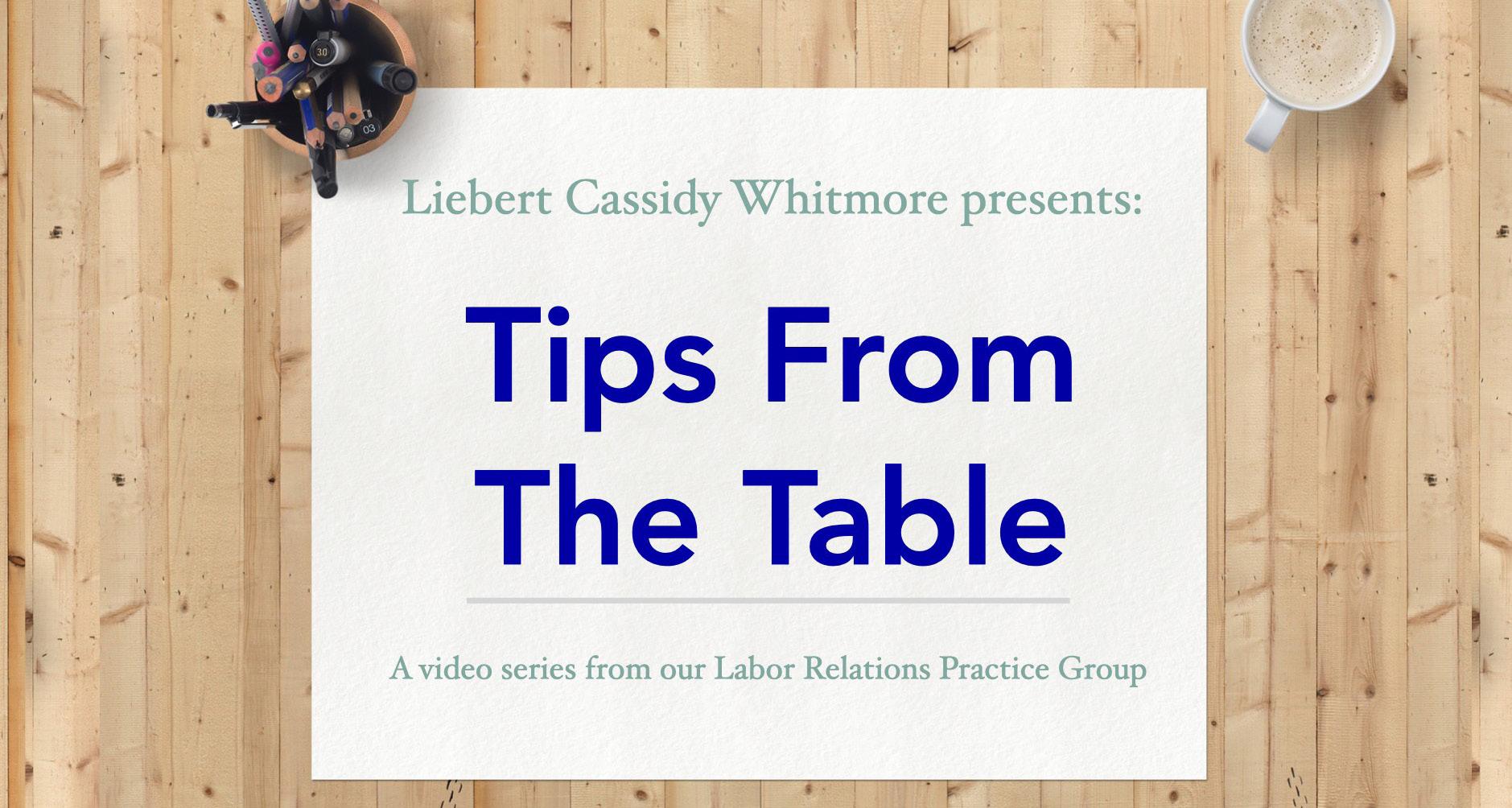Fire Watch











LCW Partner Jennifer Rosner secured an appellate victory in a peace officer termination case. A captain in a sheriff’s department challenged his termination by claiming a violation of the Police Officers Bill of Rights Act’s (POBRA) one-year statute of limitations for conducting an investigation. Jennifer’s victory resulted in a published decision of the California Court of Appeal.
The captain had been a county employee for approximately 22 years. In around April of 2016, the chief learned of a rumored intimate relationship involving the captain and a female deputy. In May 20, 2016, the chief learned of another alleged relationship between the captain and a second female deputy. A personnel investigation then revealed the captain had maintained multiple sexual relationships with female employees in violation of department policy and general orders.
On June 3, 2016, the captain received written notice that he was the subject of an administrative internal affairs investigation into allegations that he had inappropriate relationships with other department employees/ subordinates. A detailed report, dated April 10, 2017, sustained allegations of the captain’s improper conduct. That same day, the captain received a notice of intent to terminate, and he was terminated on April 25, 2017. The captain lost his subsequent administrative appeal, and filed a petition for writ in the superior court to overturn his termination. The superior court denied the petition and agreed with the hearing officer’s finding that
there was sufficient evidence to substantiate the captain’s misconduct. The court found no POBRA violations.
The captain appealed the superior court’s ruling. On appeal, the captain alleged only that the Department violated his POBRA rights by failing to complete its internal investigation within one year of the discovery of his improper conduct. The POBRA contains a statute of limitations at Government Code section 3304, which states that “no punitive action, nor denial of promotion on grounds other than merit, shall be undertaken for any act, omission, or other allegation of misconduct if the investigation of the allegation is not completed within one year of the public agency’s discovery by a person authorized to initiate an investigation of the allegation of an act, omission, or other misconduct.”
The captain alleged that the chief should have known of his improper conduct earlier because his sexual relationships with subordinates were the subject of the department’s “rumor mill”. The captain claimed “there were at least a half-dozen supervisors and senior officers who were aware of allegations of misconduct involving [the captain] prior to April 10, 2016, all of whom could have, like [the chief], initiated a complaint inquiry.”
The Court of Appeal rejected this argument and held that the POBRA statute of limitations does not begin based on mere rumors, but only after a department determines that actionable misconduct occurred. Here, the captain failed to: identify a single individual who was “authorized to initiate” an investigation; or demonstrate that the public agency had determined that discipline should be taken prior to May 2016.
The Court of Appeal declined to “promote a policy of launching into the intimidate relationships of public safety officers on the basis of mere rumors.” The Court noted that an internal affairs investigation can have a devastating impact on the career of a public safety officer, and “should only be initiated when the officer
authorized to initiate an investigation knows or has reason to know that the conduct involves actionable misconduct” and not “on the basis of unsubstantiated rumors.”
Shouse v. County of Riverside, 84 Cal.App.5th 1080 (2022, rev. denied 2/1/23).
An LCW team led by Partner Danny Yoo and Associate Aleena Hashmi won the dismissal of a lawsuit against a special district client. When a lawsuit is filed, the entity being sued has options. One option is for the entity to answer the complaint to tell its side of the story and to assert affirmative defenses, which would shield the entity from liability even if some of the facts of the complaint are true. Another option is to file a demurrer, which asserts that even if all the allegations in the lawsuit are true, there is still no cause of action. The latter option is very challenging. Even if a court grants the entity’s demurrer, the court usually gives the person suing an opportunity to try again to file a successful lawsuit.
LCW attorneys Danny and Aleena took the more challenging option and won. First, they met and conferred with the former employee who had been separated from his employment at a special district because of the district’s inability to accommodate his disability. After many communications, the former employee’s legal counsel agreed to drop some discrimination claims and a claim for wrongful termination in violation of public policy.
Second, Danny and Aleena filed a demurrer as to the remaining claims for disability discrimination and failure to prevent discrimination. They argued that the employee pursued an administrative appeal of his separation, but then failed to challenge the special district’s administrative hearing decision upholding the separation. Because the finding in the special district’s administrative decision was that the employee could not perform the essential functions of his job with or without accommodation, the employee’s failure to timely challenge that administrative decision meant that the employee was prevented from litigating these same claims in court.
The court granted the demurrer and dismissed the lawsuit because there was no judicial avenue for the employee to challenge his separation. Our special district client benefitted from this strategy because the litigation ended before the time-consuming discovery or trial could begin.
Partner Jennifer Rosner and Associate La Rita Turner successfully convinced an arbitrator to sustain the termination of a peace officer. Throughout April and May of 2019, a city police officer had repeated law enforcement contacts arising out of domestic violence involving the mother of the officer’s child. The officer failed to report one of those incidents to the Department as required. The mother of the officer’s child came to the station to file a complaint that alleged the officer harassed her by continuously calling and texting her hateful and abusive messages.
The officer admitted to texting and calling, but claimed his communications were about seeing their daughter. The officer’s supervisor stated excessively texting or calling could be committing a crime under Penal Code 653m, and recommended the officer cease such conduct. He also reminded the officer that peace officers are held to a higher standard, which the officer claimed not to have known. Shortly thereafter, the officer texted his supervisor an explicit photograph of him and the mother of his child having sex.
On June 17, 2019, the woman sought and received a Temporary Restraining Order (TRO) for Domestic Violence against the officer. She sought and received a second TRO on November 19, 2019, after the first had expired. As part of the TRO, the Court ordered the officer to surrender his firearm. Due to the continuous harassment, the Court granted a Permanent Restraining Order against the officer on January 17, 2020. A condition of the permanent restraining order was that the officer could not own or possess a firearm for two years.
The City terminated the officer for: his failure to report one law enforcement contact; the inappropriate sexting exchange with his supervisor; and his inability to meet a primary requirement of his job: owning a firearm.
The arbitrator sustained the termination, noting that in addition to the restriction on the firearm causing obvious just cause for dismissal, “[i]t is very unlikely that any law enforcement agency would hire or retain a person with [the officer’s] history of domestic disturbance and domestic violence. It is obvious that police officers are mandated to enforce the law; and officers cannot violate the same laws that they are required to enforce. That is absolutely unacceptable.”



We're thrilled to announce that registration is now open for the 24th Annual LCW Conference taking place March 16 - 17, 2023. After a couple of years of Zoom meetings and virtual hangouts, we're looking forward to seeing you in-person for the 2023 LCW Conference in San Diego!
The LCW Conference is California's premier public sector employment and labor relations educational event. Our speakers are California labor relations and employment law attorneys who have dedicated their careers to representing and supporting California's cities, counties, special districts, public safety agencies and public educational institutions.
When: March 16 - 17, 2023
Where: Hilton San Diego
1 Park Boulevard San Diego, CA 92101
2023 LCW Conference attendees will gain access to:
• Top-notch Employment and Labor Relations Presentations. As always, the LCW Conference will offer the best and most timely information on California employment and labor relations topics available presented by our expert speakers.
• MCLE, HRCI and POST Credit. Do you need MCLE, HRCI, or POST credit? Don't worry, we've got you covered!
• Fun Activities. It wouldn't be the LCW Conference without some fun activities mixed in! We're creating exciting ways for attendees to decompress and have some fun. Stay tuned!
REGISTER HERE.
* Please note that you must register for a pre-conference session separately from the LCW Conference.
The keys to successful negotiations include planning and costing. Just like planning a vacation, the amount of time and effort you put into planning and costing can determine the success of the trip. Costing contract proposals is similar to costing excursions on a vacation – they all sound like a good idea but can we afford them? Join us at this workshop to learn the importance of costing and the methods you can use to make costing easy. Participants will not only be provided with the tools to cost proposals, but will engage in interactive exercises where they set up an MOU Master Spreadsheet and proposals to cost. Bring your laptop and your Excel skills.
This workshop is our LCW Conference Pre-Conference session and is also part of our Labor Relations Certificate program.
We’ve added Bonus Content, since it is also our pre-conference session: CompensationSurveys&CollectiveBargaining!
As a bonus to this year’s pre-conference workshop, additional information on the development, impact, and usefulness of compensation surveys in collective bargaining will be highlighted and shared with attendees!
Register on our website here.



Whether you are new to public sector labor and employment relations, or an experienced practitioner, this pre-conference session ensures that you are up to date on the most significant legal updates and fundamental issues facing public sector Human Resource professionals, including:
We hope you will join us for this informative, interactive day designed to help you learn and hone your knowledge and skills so that you can operate at peak efficiency in tackling the HR challenges ahead.
Register on our website here.
Joan Opara, a 62-year old woman of Nigerian national origin, worked as a Revenue Officer at the Internal Revenue Service (IRS). Opara was investigated for several alleged Unauthorized Access of Taxpayer Data (UNAX) offenses. Pending the investigation, she was reassigned to administrative work which included, among other tasks, washing the office’s government vehicle and cleaning cubicles.
After the investigation, Opara received an opportunity to respond to the charges at a meeting before Paul Alvarado, who was the hearing official. Seven years prior, Opara had successfully brought an EEO complaint against Alvarado’s mentee Rosanna Savala because Savala allegedly quoted Alvarado with phrases such as “if anyone is too old to do this job, she should quit” and “the job was better with young people.” Opara alleged that her superiors exaggerated the nature and severity of her several UNAX offenses. The IRS terminated Opara’s employment.
After unsuccessfully pursuing an EEO complaint, Opara sued the Treasury Secretary in the U.S. District Court alleging that her termination was based on her age and national origin in violation of the Age Discrimination in Employment Act (ADEA), and Title VII, respectively. The district court granted summary judgment to the Treasury Secretary on the grounds that Opara: 1) failed to establish a prima facie case of age discrimination; and 2) failed to show that the IRS’s proffered reasons for her termination were a pretext for age or national origin discrimination.
On appeal, the Ninth Circuit applied the McDonnell Douglas burden-shifting framework, which first requires the employee to establish a prima facie case of discrimination. Upon doing so, the burden then shifts to the employer to produce a legitimate, non-discriminatory reason for the adverse action. If the employer can do so, the
burden shifts back to the employee to show that the employer’s proffered reason is a pre-text for discrimination.
An employee may offer direct or circumstantial evidence to establish her prima facie case. Here, Opara offered circumstantial evidence: her uncorroborated testimony about the decision maker’s allegedly biased statements; the alleged exaggeration of the severity of Opara’s UNAX offenses; and the alleged “draconian” punishment of cleaning cubicles and cars.
The Ninth Circuit held that very little evidence of discriminatory animus is necessary to establish a prima facie case of age discrimination on a motion for summary judgment. Opara’s three pieces of evidence were enough to establish a prima facie case. However, once the employer provides sufficient evidence for its actions and the burden of proof shifts back to the employee, the employee’s own, uncorroborated allegations alone are not enough to raise a genuine issue as to pretext.
The Ninth Circuit held that the IRS had met its burden of proving legitimate, nondiscriminatory reasons for its decisions. First, once a Revenue Officer is under investigation for a UNAX offense, the Officer cannot access the computer system necessary to perform her usual duties. Second, the assignment to cleaning duties, including cleaning the office and a vehicle, were undisputedly the type of duties that were performed by secretarial staff. Third, the supervisor’s manual stated that termination was the appropriate penalty for a first time UNAX violation.
The Ninth Circuit held that Opara failed to meet her burden to show that the IRS’s reasons for her termination were a pretext for age discrimination. At the pretext stage, Opara could not rely on her testimony about the agebiased statements the decision maker allegedly made to prove that the IRS’s proffered reasons for Opara’s termination were pre-textual. The Ninth Circuit stated that at the pretext stage on a motion for summary judgment, the court has “refused to find a ‘genuine issue’ where the only evidence presented is ‘uncorroborated and selfserving’ testimony.”
Similarly, the Ninth Circuit assumed that even if Opara could establish a prima facie case of national origin discrimination, she would not succeed in using her own testimony to create a genuine issue as to whether the proffered reasons for her termination were “false” or whether her termination was due in whole or in part to her national origin.
Because Opara had no evidence other than her uncorroborated statements to support her claim of pretext, the Ninth Circuit affirmed the summary judgment against her.
Opara v. Yellen, 57 F.4th 709 (9th Cir. 2023).
Note:
This case highlights how powerful a motion for summary judgement can be in a discrimination case. An employer can avoid a costly trial if the person suing has not produced any corroboration of her allegations of discriminatory animus.



For more information on some of our upcoming events and trainings, click on the icons below:



In January and March 2020, an organization called the Freedom Foundation submitted two requests under the California Public Records Act (CPRA). The CPRA generally requires a public agency to disclose public records upon request, unless an exemption or privilege applies.
The Freedom Foundation requested a variety of information on the bargaining unit membership of state employees. For each employee currently employed in certain bargaining units, it requested: full name, month and year of birth, job classification title, job classification code, employee identification number, hire date, current pay rate/salary, work email address, worksite/duty station address, and bargaining unit number.
The California Department of Human Resources (CalHR) had the information requested via a report it purchased on a yearly basis from the database of another department of the state government. CalHR then used this report to inform its decisions about formulating bargaining proposals, evaluate proposals from unions, and inform and direct its negotiators concerning labor relations.
Because CalHR uses the information the Freedom Foundation requested in a strategic manner and to inform its decisions, CalHR contended it did not have to provide the information due to the deliberative process privilege. The Freedom Foundation argued that the privilege did not apply because no decision or strategy was contained in the records requested; the records contained only the information used in making a decision or strategy.
However, the trial court stated that the relevant definition of the deliberative process privilege is not only records that reveal a state agency’s deliberative process, but also records that reveal a state agency’s impressions, evaluations, opinions, recommendations, meeting minutes, research, work products, theories, or strategy. The trial
court found that the requested information revealed CalHR’s research and evaluation of information, and therefore, the information was protected by the deliberative process privilege.
The Freedom Foundation appealed to the California Court of Appeal, which promptly affirmed the lower court’s decision.
A related issue in this case dealt with whether CalHR was required to search the database of the other government department to come up with the information requested. As referenced above, that other government department owned, controlled, and operated this database. CalHR did not possess the database or have the power or authority to manage, direct, or oversee the information within it. All CalHR did was view the parts of the database contained in the report it obtained. Because CalHR did not have control over or possess the relevant files, the trial court and Court of Appeal held that CalHR was not required to search the other agency’s database and provide further information.
Freedom Foundation v. Superior Court of Sacramento County, 302 Cal.Rptr.3d 655 (2022).
Note:
This case illustrates the breadth and depth of the deliberative process privilege, and how agencies can use it to protect internal collective bargaining deliberations and strategies. Although this case concerned the deliberative process for state agencies at the newly recodified Public Records Act at Government Code section 7928.405, an identical deliberative process statute for local government agencies is codified at Government Code Section 7928.410.
Whether you are looking to impress your colleagues or just want to learn more about the law, LCW has your back! Use and share these fun legal facts about various topics in public safety.
• San Bernardino County firefighters successfully rescued 1-year old Australian Shepherd dog, Seamus, from floodwaters that carried him into a storm drain in mid-January 2023. He was reunited with his owners later that same day thanks to their quick efforts.
• El Dorado Hills Fire Department inducted 6-year-old Matthias Gross as an honorary firefighter and bestowed him with a Civilian-Life Saving Award in December 2022 after his quick reactions saved his grandmother’s life during a diabetic episode.
• The Federal Firefighters Fairness Act, signed into law at the end of 2023, gives federal firefighters the presumption that their illness is due to their work, rather than making them prove when and where an exposure occurred, to qualify for workers comp or disability benefits.
The LCW Labor Relations Certification Program is designed for labor relations and human resources professionals who work in public sector agencies. It is designed for both those new to the field as well as experienced practitioners seeking to hone their skills. Participants may take one or all of the classes, in any order. Take all of the classes to earn your certificate and receive 6 hours of HRCI credit per course!

Join our upcoming HRCI CertifiedLabor Relations Certification Program Workshops:
1. February 16 & 23, 2023 - The Rules of Engagement: Issues, Impacts & Impasse

2. April 20 & 27, 2023 - Nuts & Bolts of Negotiations
3. May 18 & 25, 2023 - The Public Employment Relations Board (PERB) Academy
INTERESTED? Visit our website: www.lcwlegal.com/lrcp

LCW has 30+ consortiums across the State! Consortium members enjoy access to quality training throughout the year, discounts on other LCW products and events, and unlimited, complimentary telephone consultation with an LCW attorney on matters relating to employment and labor law questions (including questions involving COVID-19, supervisory skills, and negotiation matters!). We’ve outlined a recent consortium call and the provided answer below. Client confidentiality is paramount to us; we change and omit details in the ERC Call of the Month.
The City has a firefighter who worked a voluntary overtime shift. The firefighter was injured on duty and spent part of her overtime (OT) shift seeking medical attention, before returning to work the rest of the overtime shift. Must the firefighter be paid overtime wages for the time she spent seeking medical attention, or should she be paid normal wages?
According to the FLSA regulations, “Time spent by an employee in waiting for and receiving medical attention on the premises or at the direction of the employer during the employee’s normal working hours on days when he is working constitutes hours worked.” (29 CFR Section 785.43). Once the fire department scheduled the firefighter to work the shift, and presuming that a supervisor directed the firefighter to seek medical attention, this regulation would likely cover the situation described above. Therefore, the firefighter would be entitled to OT wages for this time if she was contractually entitled to it (i.e. because the MOU authorizes OT for time worked outside of a regular shift), or because she is entitled to OT wages under the FLSA for working hours over the applicable maximum hours threshold.

 By: Dana Burch
By: Dana Burch
While those of you in the public sector are accustomed to seeing salary information in job postings, now private employers who post jobs in California are required to post salary ranges in their job advertisements. Effective January 1, 2023, California expanded its pay transparency laws. The new law has two major components: 1) pay scale disclosure; and 2) pay data record keeping and reporting. Read on to find out how these laws impact your organization.
Under the new law, all private employers with 15 or more employees who post jobs in California will need to include pay scale data in published job advertisements. Moreover, if an employer uses a third party to advertise a job, the employer must provide the third party with a pay scale to include in the job posting. The law describes the pay scale is “the salary or hourly wage range that the employer reasonably expects to pay for the position.” However, there is no further guidance in the statute about how broad the pay scale range can be.
While the salary disclosure requirements may be old hat for public entities, there are components of the new law that apply to both the private sector and the public sector. For example, upon request, all employers of any size are required to disclose the pay scale for a position to both job applicants and current employees.
Similarly, the portions of the law regarding salary determinations apply to both public and private sector employers. Under Labor Code section 432.3, employers cannot rely on an applicant’s salary history as a factor in determining whether to offer employment or in determining what salary to offer an applicant. In fact, employers are prohibited from seeking an applicant’s salary information. However, nothing in the law prohibits an applicant from voluntarily disclosing salary history information to a prospective employer. If an applicant voluntarily discloses salary history information without prompting, then the employer can consider such information in setting the salary for the applicant. So, what can you ask an applicant when it comes to pay? You can ask about the applicant’s salary expectation for the position for which they have applied.
California’s new pay transparency law also impacts employer data reporting for both public and private sector employers. The law also requires employers to maintain records of job title and wage history for each employee for the duration of employment plus three years. The Labor Commissioner can inspect those records to determine if there is a pattern of wage discrepancy. If employers violate these rules the Labor Commissioner may issue penalties up to $10,000. Moreover, if an employer fails to keep records in violation of Labor Code section 432.3, there is a rebuttable presumption of pay disparity in favor of the employee if the employee makes a legal challenge. This is especially important to note because the new law created a private right of action for violations of the pay transparency law, giving aggrieved parties the right to seek injunctive and “any other appropriate relief.”
What can you do to be ready for the new law?
• Make sure your job advertisements include salary information.
• Be sure your hiring personnel are aware of what they can and cannot ask applicants regarding their salary history. LCW offers training on hiring and a variety of other topics. Contact Anna M. SanzoneOrtiz (asanzone-ortiz@lcwlegal.com) for more information on LCW’s training programs!
• Maintain job title and wage history information for three years after employee separation.
• Consider a pay equity audit of current employee wages to ensure there are not any significant discrepancies or inequities.
• Consider developing a formalized pay equity policy.
The law is seen as a positive step towards achieving pay equity in California, and is a model for other states to follow. However, it remains to be seen how effective the law will be in achieving its goals, and how it will be enforced.
If you have any questions or need further guidance on how to comply with California’s wage transparency law, contact your trusted legal counsel.
View the full article on our blog here.

